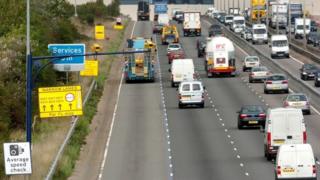 Image copyright
PA
Image caption
Most motorways have a 50mph limit through roadworks
Image copyright
PA
Image caption
Most motorways have a 50mph limit through roadworks
Speed limits through most roadworks on England's motorways will be increased to increase traffic flow and ease driver "frustrations".
Highways England says raising the limit to 60mph from the usual 50mph comes after "extensive research and trials".
The AA welcomed the move, saying it would reduce journey times and help reduce tailgating by motorists.
Previously, unions have said increasing speeds through roadworks will put the safety of workers at risk.
Limits will not necessarily be increased at every set of roadworks.
Depending on the road layout and the work being done, 40mph and 50mph restrictions will continue to be used in places.
Image copyright PA Image caption The AA claims 60mph can be safer than 50mphGovernment-owned Highways England has tested increased speeds, including through roadworks between junctions 13 and 16 of the M1.
It found the journey time for the 24-mile route was reduced by an average of 68 seconds.
Chief executive Jim O'Sullivan said: "Road users understand that roadworks are necessary, but they are frustrated by them, so testing 60mph has been about challenging the norm while ensuring the safety of our people working out there and those using our roads.
"We have a huge programme of work planned, so being able to use 60mph where safe will continue to improve everybody's experience of our roads."
'Several deaths'
AA president Edmund King claimed driving at 60mph "is often safer than driving at 50mph".
He said: "Sticking at 50mph often leads to other drivers tailgating in order to try to force vehicles to pull over.
"Plus we have very long stretches of roadworks such as the 32 miles being converted to smart motorway on the M4 between junctions 3 and 12, where 60mph would seem much more appropriate."
The 10mph increase was suggested in 2017. At the time, the Unite union said: "Sadly, in recent years there have been several deaths of motorway workers and these changes will make their work even more dangerous.
"Already motorists frequently drive into coned-off areas. At increased speeds, it will make such potentially lethal accidents even more common."

 5 years ago
636
5 years ago
636 

